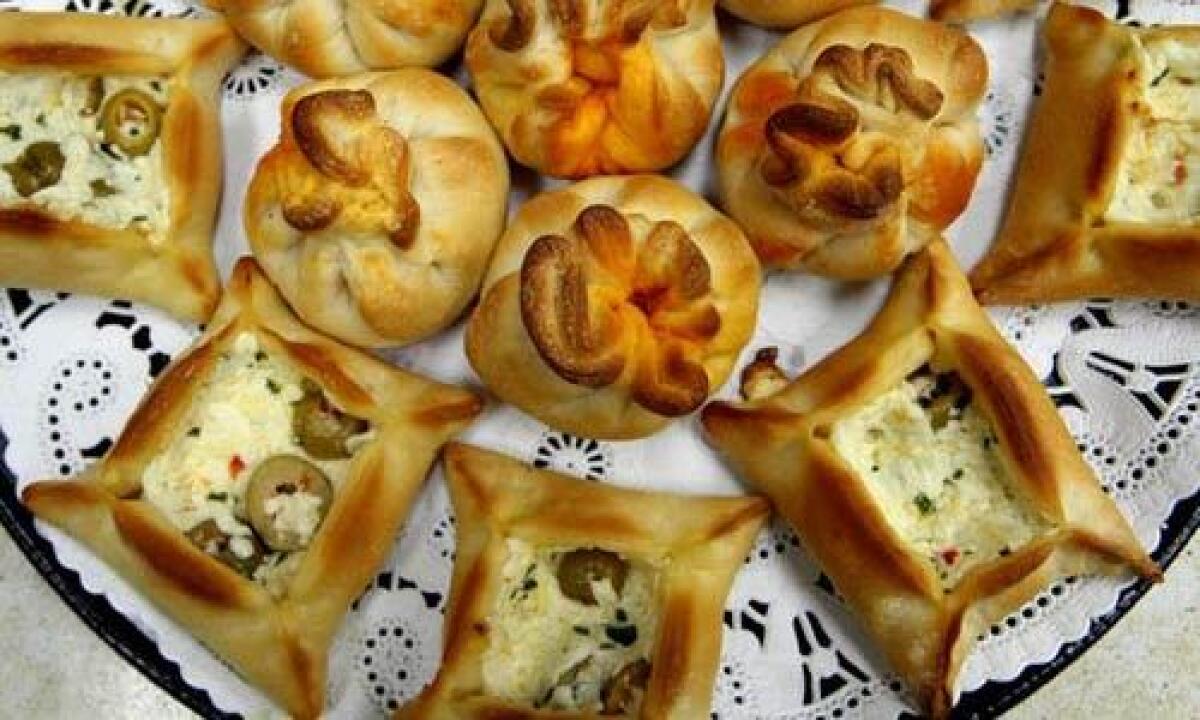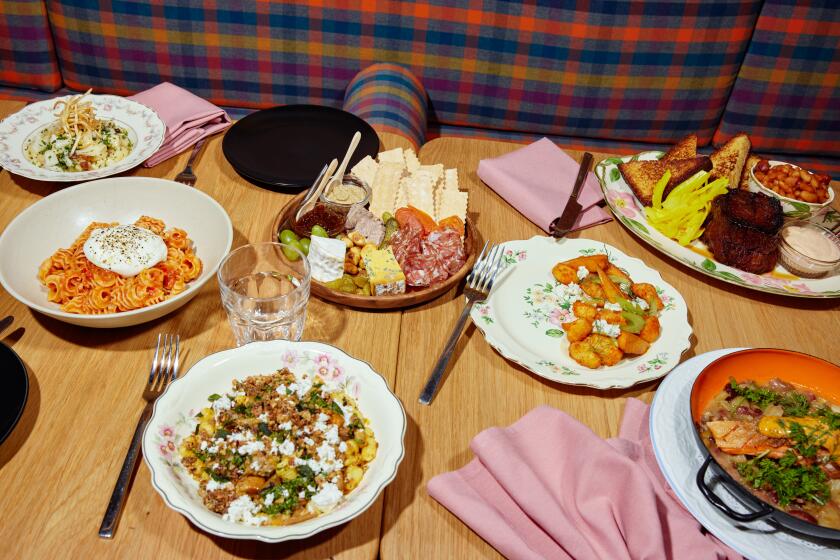Zaatar Factory in Burbank

- Share via
Sunny-side-up eggs with flowing yolks and house-made Lebanese beef sausage top the khachapuri at Zaatar Factory in Burbank.
Made to order and served warm from the bakery’s oven, the boat-shaped flatbread with high-fluted edges has the look of a chalupa. Your topping choices can vary: cheese or sautéed potatoes instead of sausage, or any combination of these. However you order it, khachapuri ranks up there with eggs Benedict or a smoked salmon omelet as a luxurious morning meal (although this 8-month-old bake shop serves it any time of the day).
The tiny shop’s repertoire, a mixture of flour, yeast and family baking tradition, is tightly focused on seasoned and stuffed Lebanese-style breads. Pastries, cakes and even basic breads are left to others.
“Baking is in our family’s blood,” Zaatar Factory co-owner Silva Haroun says as she stacks beef and mushroom-stuffed breads called burek into a sparkling new display case. “Back in Lebanon, our relatives have owned six shops like this one.”
Although the Harouns have lived here since 1979, Zaatar Factory is their first foray into the food business. It took their 23-year-old daughter, Annemarie, to get the ball rolling.
“I didn’t want to lose the recipes we inherited from my paternal grandmother,” Annemarie Haroun said. “Her home cooking inspired this food. It was she who taught her techniques to my father, Jack.”
Back in Lebanon, even the professional bakers in the family would seek her advice. And, according to Annemarie, people here who tasted her food at church gatherings and community functions knew it was something special.
Zaatar is the Arabic word for wild thyme, but it also refers to a widely used Middle Eastern herb blend that seasons a tortilla-thin flatbread called zaatar manaeesh. Tart crushed sumac berries, marjoram and toasted, crushed sesame seeds, along with the thyme in the zaatar give the bread an herbaceous, slightly lemony flavor.
The bakery makes several well-loved manaeesh variants: Harra manaeesh has a translucent glaze of mild chile sauce in place of zaatar. Lahmajoun, “bread with meat,” is sometimes dubbed Lebanese or Turkish pizza. Its fragile crust holds a thin layer of hand-chopped beef flavored with fresh mild Turkish Çorbaci peppers and dried crushed Aleppo pepper. They warm in seconds in a home oven.
But the most opulent manaeesh, dubbed the Z-Factory special, starts out as zaatar manaeesh. It’s layered with mild akawi cheese, fresh tomato slices and a scattering of olives, then finished with a raw egg that cooks perfectly in the time it takes the thin crust to bake.
Zaatar Factory turns out a kaleidoscopic assortment of burek and sfiha, amply filled breads in many shapes and sizes. Their perfectly calibrated crusts, as with Goldilocks’ ideal porridge, are neither too thick nor too thin but just right.
The foot-long torpedo-shaped spicy cheese burek holds a thick, molten slab of akawi slathered with a layer of chile-intensive house-made harra sauce. At the other end of the size scale are sfiha shami -- small, open-faced, meat-filled tartlets topped with pine nuts.
Classic triangular spinach burek stuffed with lemon-accented greens are comforting reminders of a proud Lebanese family kitchen.
While Zaatar Factory concentrates on savory baking, it does make one outstanding sweet: tahini bread. The earthy nuttiness of the dinner plate-size pastry comes from layerings of lightly sweetened sesame paste, which gives the disks a sort of mille-feuille flakiness.
With luck, you may nab the bakery’s only table out front. Just as likely, you’ll succumb to the aromas of blending herbs and baking loaves and, as with many customers, exit with a tall stack of boxes filled with enough goodies for a celebration with Zaatar Factory’s lovingly made classics.
More to Read
Eat your way across L.A.
Get our weekly Tasting Notes newsletter for reviews, news and more.
You may occasionally receive promotional content from the Los Angeles Times.










